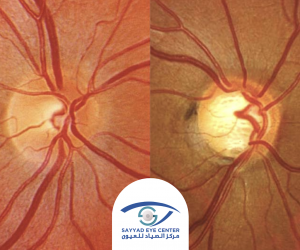What is Glaucoma?
Glaucoma is a condition that damages the optic nerve in the eye, often due to increased eye pressure. This happens when fluid builds up in the front part of your eye, leading to damage. It is a leading cause of blindness, especially for people over 60. Early diagnosis and treatment can prevent blindness.
Types of Glaucoma
- Primary Open-Angle Glaucoma: The most common type, it develops slowly and is painless. It doesn’t show vision changes early on, but over time, the eye’s fluid drainage system becomes less efficient, leading to increased pressure that damages the optic nerve. Regular eye exams are important, especially if there is a family history of glaucoma.
- Angle-Closure Glaucoma (Narrow-Angle Glaucoma): This type occurs when the iris blocks the drainage angle of the eye. It can cause a sudden rise in eye pressure, leading to a medical emergency. Immediate treatment is needed to prevent blindness. Symptoms include:
- Sudden blurry vision
- Severe eye pain
- Headache
- Nausea or vomiting
- Seeing rainbow-colored halos around lights
Causes of Glaucoma
Your eye produces a fluid called aqueous humor. This fluid needs to drain out through the drainage angle in your eye to maintain normal pressure. If the drainage angle doesn’t work properly, fluid builds up and increases pressure, which damages the optic nerve. Over time, this can cause blind spots in your vision, and if left untreated, lead to blindness.
Who is at Risk for Glaucoma?
Certain people are at higher risk, including those who:
- Are over 40 years old
- Have a family history of glaucoma
- Are of African, Hispanic, or Asian descent
- Have high eye pressure
- Are nearsighted or farsighted
- Have experienced eye injuries
- Use long-term steroid medications
- Have thin corneas
- Have diabetes, migraines, high blood pressure, or poor blood circulation
How to Diagnose Glaucoma?
A complete eye exam is required to diagnose glaucoma. Simply checking eye pressure is not enough. During an exam, your eye doctor will:
- Measure your eye pressure
- Inspect the drainage angle
- Check for damage to the optic nerve
- Test your peripheral vision
- Take a picture or scan of the optic nerve
- Measure the thickness of your cornea
Glaucoma Treatment
- Medications:
Eyedrops are commonly used to reduce eye pressure. It is crucial to use them exactly as prescribed to prevent vision loss. Always inform your doctors about any glaucoma medications you’re taking. - Laser Surgery:
There are two types of laser surgeries to improve fluid drainage in the eye, typically performed in a clinic. - Surgery:
For advanced cases not controlled by drops or laser, surgery may be required. The goal is to create a new drainage path for fluid to leave the eye. Common surgeries include Trabeculectomy or Glaucoma Drainage Tube placement.
Early diagnosis and proper treatment can help prevent vision loss from glaucoma, so regular eye exams are essential for those at risk.


